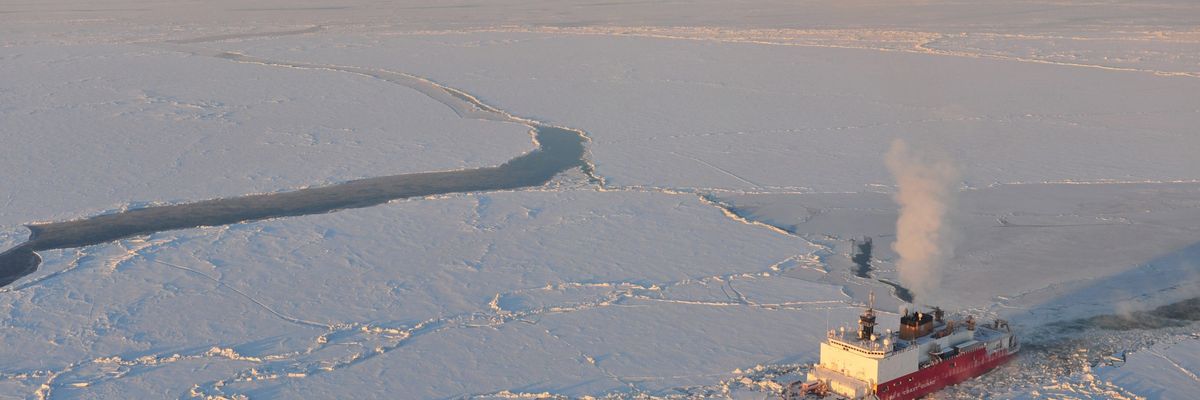Recent Chinese interest and investment in the Arctic has raised concern in Washington about China’s growing focus on the High North. While the United States sees Chinese encroachment in the Arctic as a precursor for more invasive and aggressive political ambitions outside of Asia, there is a compelling argument for military restraint and a turn towards diplomatic engagement.
First, tit-for-tat militarization in the Arctic will not be productive and second, it is not feasible for the United States to prevent any and all Chinese activity in the Arctic. Thus, third, the United States should instead push for transparency of China’s agenda in the Arctic to reduce the risk of misinformation and develop policies that deny troubling behaviors and transform them into constructive ones.
China’s Interest in the Arctic
In 2018, China declared itself to be a near-Arctic state in its Arctic Policy. For China, the Arctic is at a strategic nexus for environmental and economic concerns. Beyond that nexus, China is interested in expanding its Polar Silk Road, enhancing Chinese security and improving Arctic governance. However, China’s interest in the Arctic relates first and foremost to continued access to natural resources and use of the Northern Sea Route in order to transport those resources to other countries.
In order to use the Northern Sea Route, China has developed a close relationship with Russia both to help develop the route as well as develop energy and natural gas projects in the Russian Arctic such as the Arctic LNG-2. Beyond an interest in natural resources and economic development, China has also expressed scientific interest in the Arctic such as developing long-term ocean observation technologies.
China has also expressed interest in investing in Arctic states’ infrastructure — a development that has worried U.S. officials. According to some Arctic observers, China’s goal is to use investment and trade to gain economic leverage over Arctic states and export an Arctic governance narrative that gives China a more direct role in governing the Arctic.
In Iceland, for example, Chinese investment consisted of almost six percent of Iceland’s average GDP for the last five years. This relationship, while sought by Iceland, has given China access to Iceland’s scientific facilities, telecommunications infrastructure, and geothermal energy expertise. Similarly, in Greenland, Chinese firms have invested twelve percent of Greenland’s GDP from 2012 to 2017. In response to growing Chinese influence and investment, some states have expressed concern. In 2016, for example, Denmark and the United States prevented China from buying a defunct military base in Greenland and encouraged the state to reject Chinese offers to build international airports.
The issue of dual-use technologies
However, much of China’s scientific interest is dual use in nature. In short, civilian research now could be used to support China’s military presence in the Arctic later. Existing Chinese scholarship supports this concern with focuses on dual-use logistics support facilities throughout the region, the development of polar military technology through scientific research in the Arctic, the development of public good services (i.e. Search and Rescue), and military personnel training for Arctic weather conditions.
Given China’s increasing research capabilities including two icebreakers and research stations in Iceland and Norway, it suggests that dual-use technologies and scientific interest may be a route through which China aims to use to grow influence in the region.
Turn towards transparency
Despite the rise of Chinese interest and influence in the Arctic, there is a compelling case for the United States to not militarize in response. First and most importantly, a tit-for-tat military response has been shown to be insufficient in reducing tensions in the region. The United States also does not have the right to deny China access to the Arctic and prevent its activities. Instead of treating the Arctic as an inevitable domain for militarization, the United States would be better served by engaging with China on issues that they can cooperate on such as environmental concerns, climate change, and improving Arctic governance.
Instead, the United States should push for transparency of Chinese Arctic policy and develop policies that recognize and rebuff destructive behavior, shaping them to be more constructive in nature. Part of the problem is that China’s policy in the Arctic is difficult to classify due to the nature of dual-use technologies and China’s both cooperative approach in the Arctic Council as well as allegedly predatory investment nature towards Greenland and Iceland. Thus, the United States should push China to identify clearer goals and subsume those goals into the rules-based order that the Arctic operates under. There is no reason why diplomacy could not be used to better promote dialogue between China and the United States while also bringing in China’s more expansionist ambitions and restraining them to more reasonable terms.
















